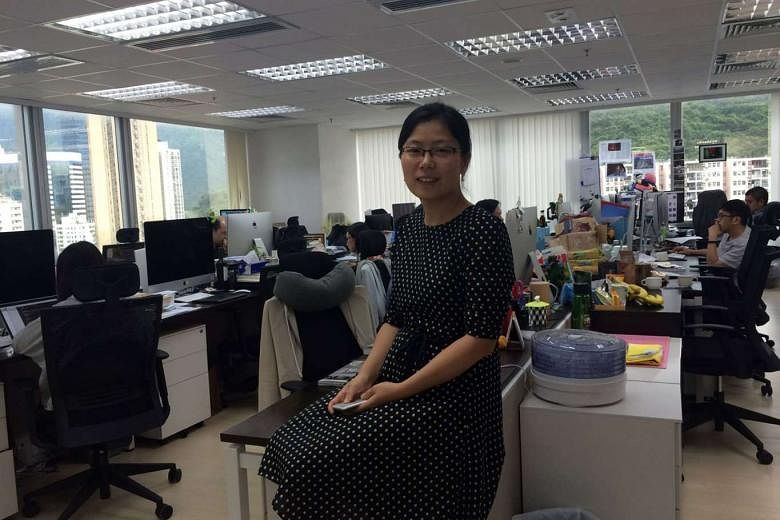HONG KONG • Like a deft seamstress, Annie Zhang Jieping is used to unpicking knots.
Her speciality is those of the Hong Kong-Chinese variety. She has had much practice: Since moving from her native Jiangsu to Hong Kong 11 years ago, she has found herself having to explain to her parents the tangles snarling the city - from anti-mainland "locust" protests to the pro-independence movement.
"There is a lot of misunderstanding between Hong Kong and China," says the 33-year-old. "Once I explain to my parents what's happening and undo one knot, there is another knot to fix."
Last August, Ms Zhang turned professional. Previously a freelance journalist for publications such as Yazhou Zhoukan, she set up news website Initium Media to offer an "outsider perspective that objectively gives the big picture on what is happening in Hong Kong".
On the Mong Kok riots in February driven by young localists, for instance, she says: "We explained the broader context of what led to their agitation, tracing the history of the democracy movement and the links with the Occupy movement.

"We can't just dismiss them as losers," she adds, referring to the derogatory label used by Chinese state media.
-
UPSTARTS
-
For a city of seven million people, Hong Kong has a crowded media market. At least 15 news websites have sprung up in the past two years to compete for eyeballs with more than 20 newspapers. Here are some of the new players:
STAND NEWS
This is one of the most widely read news sites. It tends towards a pro-democracy stance. Its board of directors includes Cantopop singer Denise Ho. -
BASTILLE POST
Set up by pro-establishment newspaper Sing Tao, this outfit covers a range of topics from entertainment to foreign news in a tabloid style. -
HKGPAO
Helmed by Mr Robert Chow, the spokesman for anti-Occupy group Silent Majority, this site purportedly received funding from tycoons Lee Shau Kee and Li Ka Shing. -
TVMOST
This online platform started as a parody of broadcaster TVB but has drawn a cult following for its satirical take on current affairs. -
OTHERS INCLUDE:
• FactWire News Agency
• HK01
• Hong Kong Free Press
• Initium
• InMedia
• Master Insight
• Memehk
• Passion Media
• Passion Times
• Speak Out Hong Kong
• VJMedia
• 852
Initium, which has 70-plus staff, is among at least 15 new online players that have charged into Hong Kong's already-crowded media scene in the past two years.
As the city undergoes political and societal unrest unprecedented since its 1997 return to Chinese rule, old-timers and newcomers alike are jockeying to shape the narrative on what is happening.
The news sites range from those backed by the financial muscle of mainstream media companies, to small outfits with a few writers and unclear sources of funding.
This is even as newspapers grapple with the twin challenges of falling circulation and political pressure, which some say takes the form of meddling by Beijing-aligned owners and self-censorship .
Says journalism professor Clement So of the Chinese University of Hong Kong: "The future of the Hong Kong news media is quite bleak, from both the economic and political angles."
Apple Daily, for instance, one of the most popular papers in this city of seven million, saw its circulation halve from 294,000 to 150,000 in just five years.
Its editor-in-chief Cheung Kim Hung says: "Ads have also dropped drastically. So we are keeping our costs down by having fewer pages and letting go of staff who can't transition to online."
As for political concerns, Professor So worries about growing polarisation between media that take a "pro-democracy" and "pro-establishment" stance. He cites two influential industry stalwarts - Ming Pao, which has had two respected editors moved out, and the English-language South China Morning Post, recently acquired by Chinese billionaire Jack Ma - as cases to watch.
Ming Pao's reputation has been dented by perceptions that it has lost its fervour for investigative political journalism.
A recent scandal involving senior civil servant Betty Fung who allegedly profited from a property exchange deal, for instance, was the sort of news story that would once have been broken by the paper. Instead, HK01, a news website run by a team of former Ming Pao journalists, was behind the scoop.
YOU HAVE APPLE, I HAVE ORANGE
Motives for setting up the new sites vary, from unhappiness by former professional journalists with the state of the media to the ego boost that comes from owning a media outlet and the desire to disseminate what some consider propaganda. All want to shape public opinion.
Funding comes from a variety of sources: investors (many of whom often do not want to be identified), advertising, public donations.
Veteran newspaperman Man Cheuk Fei, who was editor-in-chief of the Hong Kong Economic Journal Monthly, founded Master Insight two years ago with the backing of a retired insurance industry honcho.
The new outfit - which focuses on analyses by "opinion leaders" - emerged from worries that the existing media was increasingly polarised and gossipy, says Mr Man, 53. He runs it with his wife and fewer than 10 staff from a rented office in Cyberport. "We want to play a constructive role, with objective, quality and in-depth articles," he says.
So when the controversial Occupy movement happened, just as the website went live, he "gave space to both points of view".
With 10,000 visitors a day, it wants to build a brand name and gain revenue by organising paid forums with its writers as speakers. The site will break even this year.
Similarly, Initium was funded by investors who wanted "objective" reporting on Greater China, says Ms Zhang. But public distrust dogs the site because its backers include lawyer Cai Hua, a US-educated Fujian native now based in Hong Kong, who is said to have close ties with President Xi Jinping - a charge Ms Zhang rejects as baseless. She notes that Initium has published reports on sensitive subjects such as China's arrests of human rights lawyers. Initium is banned on the mainland.
The company has restructured its ownership, with the editorial team now owning 30 per cent. A venture capital firm from Taiwan pumped in money. Today, the website draws 200,000 visitors a day.
Other well-read news sites include Stand News, InMediaHK and the English-language Hong Kong Free Press. They solicit public donations, organise fund-raising events and sell advertisement space. All claim to be "independent".
Another, TVMost, has a cult following for its satirical take on current affairs. It belongs to weekly magazine 100Most - which leverages on in-house talent to produce slick digital commercials, including one in which Cantopop star Leon Lai promotes a coffee product. Others are more secretive about their funding.
In the wake of the Occupy protests, insiders said that Beijing is looking to counter what it considers to be a virulently anti-Beijing media environment in Hong Kong. At least four establishment-aligned platforms have been set up. One of them, Orange News, is reportedly funded by Beijing's Liaison Office in Hong Kong as a counter to Apple Daily.
Another is HKGPao, helmed by former radio talk show host Robert Chow, who was spokesman for an anti-Occupy organisation Silent Majority. Speak Out Hong Kong was reported by local media to have been funded by Chief Executive Leung Chun Ying's brother-in-law, though this cannot be ascertained.
These sites are not taken seriously, says an industry insider who declined to be named. "Beijing is making the point, you have Apple, I have Orange. But they are not making any inroads except maybe with some mainland readers. There isn't a genuine business model."
On the other end of the political spectrum are sites such as Passion Times, founded by radical activist Wong Yeung Tat and which espouses a nakedly localist ideology. Popular with the young, it even has an online shop selling its merchandise. There is also a smattering of sites such as Local Press which are essentially one-man operations. Again, it is not known who the investors are.
Underscoring the difficulty of separating the wheat from the chaff, the Hong Kong government still bars all online media from government events and press conferences, saying it is difficult to discern which outlets are credible and should be granted access.
FEW GOURMET DISHES
For now, the digital news buffet offers an overwhelming number of options but few gourmet dishes.
Given the resources required to pay and train reporters, HK01 and Initium are among the few new players with original news reporting.
Most others cull from the mainstream media, depend on volunteer "citizen journalists" and offer opinion pieces from contributors.
Says Prof So: "Most of these sites have clear political or ideological stands. Only a few take a neutral one or the middle ground."
This, in turn, affects credibility, readership - and thus sustainability. He estimates that only five or six sites have a significant following. The rest are "not that influential" as they are niche media visited by those with similar viewpoints.
Another challenge is in keeping up with changing reader habits. Initium, for instance, poured resources into building up its app and website. In hindsight, says Ms Zhang, she would not have done so. "People are reading from Facebook, they don't go to dedicated websites anymore."
The idea of trying to get revenue from website advertisements is thus "obsolete", let alone the concept of a "home page" that commands premium ad rates.
She puts it thus: "We are standing on shifting sands."
Apple Daily, the first to break ground in delivering online news, also finds the going tough. Says Mr Cheung: "We were a pioneer seven, eight years ago. But we need to work hard. It's changing every day."
In the past, readers were happy to read text online. Now, they just want to watch videos, he adds.
In the end, the issue is one of control. Headlines may focus on Beijing's tightening grip on Hong Kong including on its media. But for now, that is not its toughest challenge.
A top executive at a Chinese-language media outlet who asked not to be named says: "The Hong Kong government and Beijing want to control the media, but the question is, can they do it? I can frankly say, this is a big headache for Beijing: it can't really keep the entire Hong Kong media on the leash.
"When the Internet is going viral over a photo, we can't ignore it. We cannot be uncritical - we must at least look critical on surface, otherwise we will be dead to the market and lose our readers."
Back home in the city of Wuxi, near Shanghai, Ms Zhang's parents do worry a little about what their daughter is doing, she says.
"But they know that what I'm doing is reporting the truth, and so they are very supportive.
"They really care for Hong Kong and have always told me to appreciate this city. I am now practising what they have taught me to do."


